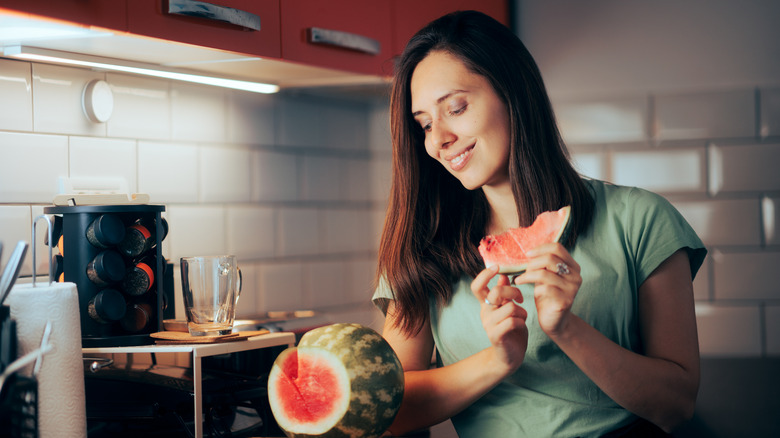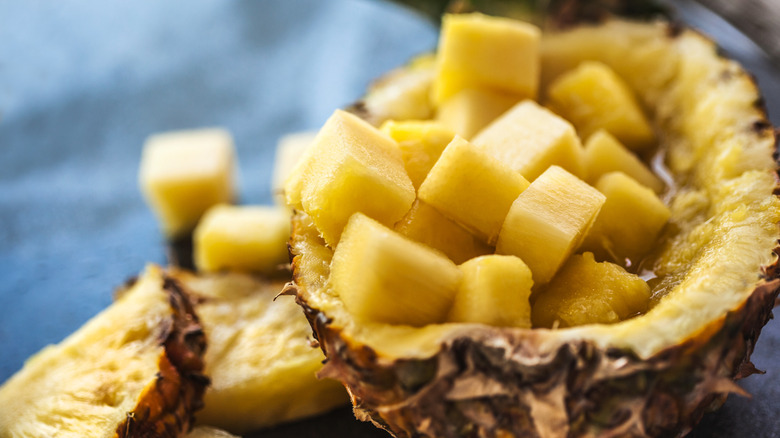Fruits are one of those foods that most nutritionists and dieticians will tell you to include in your diet. They’re packed full of antioxidants and helpful vitamins, minerals, and plant chemicals that are good for your health.
Come summer, there’s a shining star in the fruit kingdom we all reach for — watermelon. Its benefits are endless. It’s good for your immune system, aids skin and eye health, and the powerful antioxidant found in this fruit – lycopene — does a lot for your body too. Lycopene is linked with lowering blood pressure levels and overall heart health, preventing risk of stroke, and reducing inflammation and oxidative stress in the body, per Northwestern Health Sciences University.
So, what’s the harm in having some of this fruit before going to sleep? Surely, it’s so hydrating that it should cool you down and give you some sweet zzz’s, right? Not really, according to science. The same thing that makes watermelon a great summertime snack — its rich water content — is the same reason it’s a food you should never eat before bed, unless of course you consider a few trips to the bathroom in the middle of the night essential for quality sleep (Spoiler alert: they’re not). More foods that contain high water content that could do the same to your bladder? Celery and cucumbers, per Sleep Health Solutions.
The sugar and acid content in watermelon might also be a concern

If you want to avoid heartburn while you sleep, watermelon isn’t the fruit for you. The acid-producing nature of this fruit could make it problematic in terms of digestion and sleep (via WebMD).
Despite its many wonders and being considered a fruit that compares better to other high-sugar fruits, watermelon still contains a considerable amount of sugar (1 wedge has as much as 17.7 grams, per U.S. Department of Agriculture). And excessive amounts of sugar have a way of disrupting sleep. “Eating sugar late at night overstimulates you. It gives you energy and makes you ready for activity, but that is not what we’re trying to do at night. We’re designed to shut down towards the end of the day,” shared dietitian Alex Evans with The Guardian.
Good sleep is about a lot more than dimming the lights in your bedroom, choosing the right pillows, and lighting scented candles to create that nice relaxing ambiance. Even nutritious fruits like watermelons can work against you if you’re not careful about when you eat them and in what quantities. Are there any kinds of fruits you don’t have to avoid at night?
Eat these fruits at night if you want better sleep

Potassium-rich bananas and magnesium-rich apricots and dates can help with better sleep, reported Medical News Today. Potassium will help prevent muscle cramping, while magnesium has been linked with falling asleep faster, staying asleep for longer, and boosting levels of melatonin, per Sleep Foundation.
When you eat fruit before bed, seek out tryptophan-rich snacks. An increase in tryptophan has been associated with an increase in serotonin and therefore an increase in melatonin, per Healthline.
Double-certified integrative nutrition health coach and nutrition consultant, Edie Horstman recommends pineapple (via Camille Styles). “Pineapple contains plenty of tryptophan to boost serotonin in the brain. Additionally, pineapple is full of bromelain, which has anti-inflammatory properties.” Eating fruit before bedtime is a nutritious way to curb hunger pangs and incorporate fruit into your diet. It’s just important to figure out what fruits work best for what times of the day. Also be mindful of portion sizes. Most fruits contain a decent concentration of sugar so sticking to moderate consumption is always best.



